This article relies largely or entirely on a single source .(June 2020) |
Ramizuddin Ahmed was a social worker and politician.
This article relies largely or entirely on a single source .(June 2020) |
Ramizuddin Ahmed was a social worker and politician.
Ahmed was born in 1902 in Gazipur village, Daudkandi Upazila, Comilla District, Bengal Presidency, British India. He completed his undergrad and masters in Arabic language. Afterwards he finished law school. [1]
Ahmed started his legal practice in Comilla District. In 1936, he joined the Krishak Praja Party led by A. K. Fazlul Huq. He was elected to the Bengal Legislative Assembly in 1937 and served there till 1945. He worked towards the abolition of the Zamidar system and amending the Tenancy Act. [1] He represented Trippera in the Assembly. During the Bengal Famine of 1943, he said in the assembly the food kitchens were initially open through private initiative and then afterwards government initiative. [2]
In 1956, he was elected to the National Assembly of Pakistan. He was an appointed the Minister of Communication. He is known for improving the railways in East Pakistan during his tenure as Communication Minister. He was re-elected to the National Assembly of Pakistan in 1962. [1]
Ahmed died in 1985. [1]
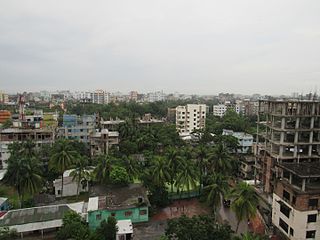
Comilla District, officially known as Cumilla District, is a district located in southeastern Bangladesh. It lies about 100 kilometres south east of Dhaka. Comilla is bordered by Brahmanbaria and Narayanganj districts to the north, Noakhali and Feni districts to the south, Tripura state of India to the east and Munshiganj and Chandpur districts to the west.

The Bengal Presidency, officially the Presidency of Fort William in Bengal, later the Bengal Province, was the largest of all three presidencies of British India during Company rule and later a province of India. At the height of its territorial jurisdiction, it covered large parts of what is now South Asia and Southeast Asia. Bengal proper covered the ethno-linguistic region of Bengal. Calcutta, the city which grew around Fort William, was the capital of the Bengal Presidency. For many years, the governor of Bengal was concurrently the governor-general of India and Calcutta was the capital of India until 1911.

Abul Kasem Fazlul Huq, popularly known as Sher-e-Bangla, was a Bengali lawyer and politician who presented the Lahore Resolution which had the objective of creating an independent Pakistan. He also served as the first and longest Prime Minister of Bengal during the British Raj.

Brahmanbaria is a district in eastern Bangladesh located in the Chittagong Division. Geographically, it is mostly farmland and is topographically part of the Gangetic Plain. It is bounded by the districts of Kishoreganj and Habiganj to the north, Narsingdi District and Narayanganj to the west, Comilla to the south, and the Indian state of Tripura to the east. It was a part of Comilla District until 15 February 1984.

Mizanur Rahman Chowdhury was a Bengali politician, most notable for serving as Prime Minister of Bangladesh from 9 July 1986, to 27 March 1988.
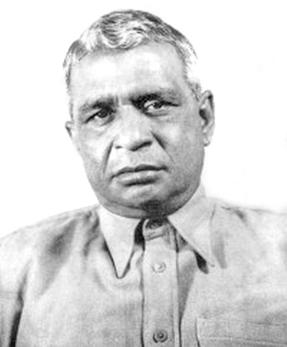
Dhirendranath Datta was a Bengali lawyer by profession who was also active in the politics of undivided Bengal in pre-partition India, and later in East Pakistan (1947–1971).
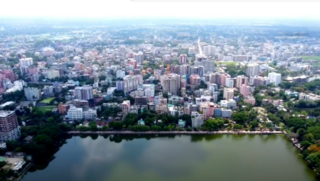
Comilla, officially spelled Cumilla, is a metropolis on the banks of the Gomti River in eastern Bangladesh. Comilla was one of the cities of ancient Bengal. It was once the capital of Tripura kingdom. Comilla Airport is located in the Dulipara area of Comilla city. Along with the Comilla Economic Zone EPZ, various industrial factories have come up at the airport, making the airport area a business and commercial city. Comilla City is a division centered city district with surrounding districts coming to Comilla in more diverse areas of work. Bibir Bazar land port is located 5 km away from Comilla city. The area of Comilla City Corporation is 53.04 square kilometers, so the surrounding areas of the main city fall under the jurisdiction of the City Corporation. The urban areas falling outside the city corporation are considered as suburbs with a population of 600,000.

Fazlul Quader Chowdhury was a Bengali politician who served as the 5th speaker of the National Assembly of Pakistan from East Pakistan. He belonged to Ayub Khan's Convention Muslim League. He was also the acting president of Pakistan from time to time when Ayub Khan left the country. His elder brother Fazlul Kabir Chowdhury was the leader of the opposition in East Pakistan assembly. Quader was preceded by Maulvi Tamizuddin Khan of Awami League.
The Krishak Sramik Party was a major anti-feudal political party in the British Indian province of Bengal and later in the Dominion of Pakistan's East Bengal and East Pakistan provinces. It was founded in 1929 as the Nikhil Banga Praja Samiti to represent the interests of tenant farmers in Bengal's landed gentry estates. Sir Abdur Rahim was its first leader. A. K. Fazlul Huq was elected leader in 1935 when the former was appointed as the president of the Central Legislative Assembly of India. In 1936, it took the name of Krishak Praja Party and contested the 1937 election. The party formed the first government in the Bengal Legislative Assembly. After the partition of British India, it was reorganized as the Krishak Sramik Party to contest the 1954 election, as part of the United Front. The coalition won the election and formed the provincial government in the East Bengal Legislative Assembly.
Syed Nausher Ali was an Indian left-leaning politician in West and East Bengal during British rule. He was a cabinet member in the first A. K. Fazlul Huq ministry and later the Speaker of the Legislative Assembly in the second coalition Ministry. He was renowned for his advocacy of abolition of British imperialism and his support of Hindu-Muslim cooperation in the form of an undivided India.
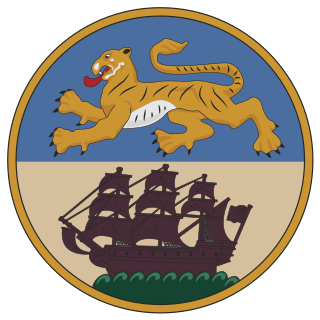
The prime minister of Bengal was the head of government of Bengal Province and the Leader of the House in the Bengal Legislative Assembly in British India. The position was dissolved upon the Partition of Bengal during the partition of India in 1947.
Ashrafuddin Ahmad Chowdhury was a Bengali politician who had served as general secretary of the Congress Party's Bengal branch, member of the East Bengal Legislative Assembly and later as the education minister of Pakistan. He was an advocate of Huseyn Shaheed Suhrawardy's United Bengal proposal.
Musharraf Hussain was an Indian politician. He was a minister in the Bengal Legislative Assembly and was later a member of the West Bengal Legislative Assembly.
Mafizuddin Ahmad was a Bengali politician and former government Minister of East Pakistan.

The Bengal Legislative Assembly was the largest legislature in British India, serving as the lower chamber of the legislature of Bengal. It was established under the Government of India Act 1935. The assembly played an important role in the final decade of undivided Bengal. The Leader of the House was the Prime Minister of Bengal. The assembly's lifespan covered the anti-feudal movement of the Krishak Praja Party, the period of World War II, the Lahore Resolution, the Quit India movement, suggestions for a United Bengal and the partition of Bengal and partition of British India.
Adeluddin Ahmad was a Bangladeshi lawyer and politician.
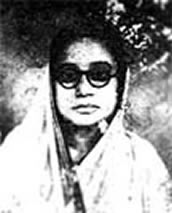
Selina Banu was a Bangladeshi politician, social activist, and feminist.
Kamini Kumar Dutta was a Bengali politician and former Law Minister of Pakistan.

Athar Ali was a Bangladeshi Islamic activist, author, teacher and politician. He participated in the Indian independence movement, and was former president of the Nizam-e-Islam Party. Ali was also a khalifah of Ashraf Ali Thanvi, one of the founders of the Deobandi movement.
Fazlur Rahman was a Pakistani Bengali politician and lawyer. He was the first Education Minister of Pakistan and a member of the 1st and 2nd National Assemblies of Pakistan.